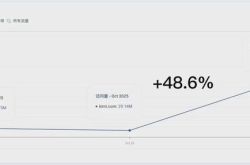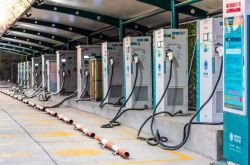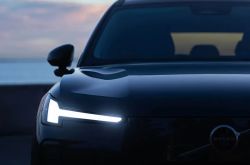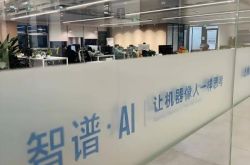Porsche, Off the Pedestal?
![]() 06/18 2024
06/18 2024
![]() 525
525
The high-end positioning of new energy vehicles has subtly
Influenced Chinese people's perception of luxury cars
While Porsche has not yet truly realized this change
How competitive is China's automobile market nowadays? Porsche, once known as the "most profitable brand" in China, has recently been collectively "protested" and "boycotted" by dealers, preparing to "force" the German headquarters.
According to multiple media reports, due to Porsche's recent significant sales decline, dealers have had to sell cars at a loss. However, to meet sales targets, the manufacturer not only failed to consider the dealers' survival environment but also adopted aggressive inventory pressure measures, which intensified the conflict between the two sides. Three Porsche dealers jointly sent a letter to Porsche, requesting compensation or subsidies from headquarters for recent losses on new car sales, as well as the replacement of Porsche China's senior management.
After the incident escalated, Porsche China issued a "Joint Statement of Porsche China and All Authorized Dealers," stating that the current automotive industry is undergoing unprecedented major changes, and it is facing complex issues together with dealers. Porsche China will maintain a long-term and mutually trusting dialogue mechanism with dealers to jointly seek effective ways to respond to market changes.
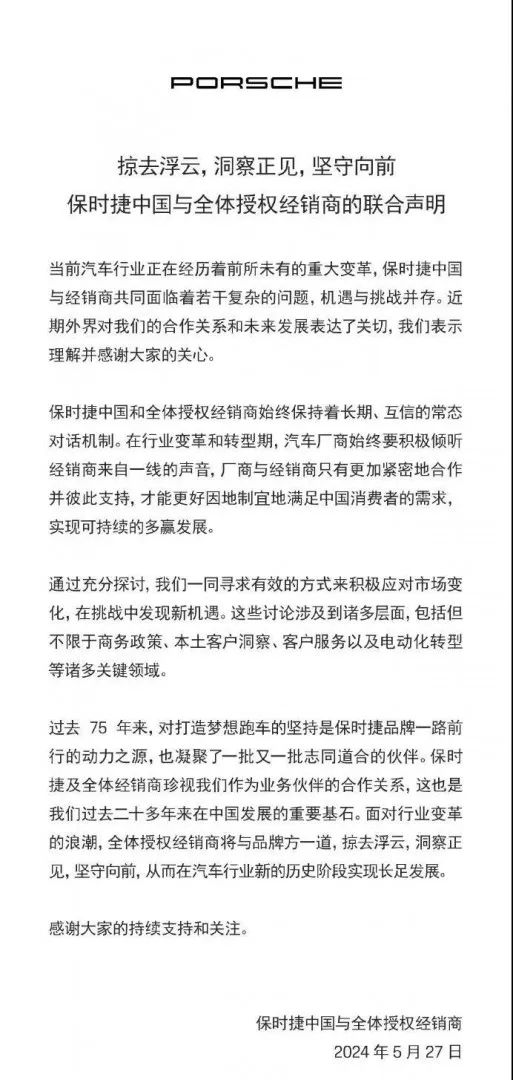
Image source: Porsche
In fact, under the circumstances of a significant sales decline, most manufacturers have once engaged in inventory pressure, with numerous cases of dealers facing bankruptcy due to inventory pressure. However, this seems to have always been irrelevant to Porsche, whose strong profitability has always been praised by the outside world. In 2024, why is it Porsche that can't hold on first?
Declining Sales
Just two years ago, Porsche was still in the limelight in the Chinese market, maintaining the "largest single market for Porsche globally" for eight consecutive years, accounting for up to 30% of its global sales. However, starting from last year, the situation took a sharp turn for the worse. In 2023, Porsche delivered 79,300 vehicles in the Chinese market, a year-on-year decrease of 15%, making it the only declining market for Porsche globally and losing its status as the largest single market for Porsche for eight consecutive years.
In 2024, Porsche's decline has not stopped. Data shows that in the first quarter of this year, Porsche delivered a total of 77,640 new vehicles globally, a year-on-year decline of 4%. Among them, 16,340 vehicles were delivered in China, a year-on-year decline of 24%.
The decline far exceeding the global market confirms Porsche's difficulties in the Chinese market. Although Oliver Blume, the Chairman of the Executive Board of Porsche AG, previously stated that Porsche faces challenges in the Chinese market but has no intention of joining the fierce price war in China. However, in reality, Porsche's price defense line in the Chinese market has long since collapsed.
In contrast to Porsche's previous "price increase" sales situation, Porsche models are currently experiencing significant price drops in the terminal market. For example, the Taycan, Porsche's first pure electric sports car, officially launched on September 4, 2019, with a price range of 898,000 to 1,838,000 yuan. Currently, multiple Porsche dealerships can offer discounts of 200,000 to 300,000 yuan, with the maximum discount approaching 40%.
In April of this year, the all-new Taycan began pre-sales with prices ranging from 1,008,000 to 1,998,000 yuan. Therefore, some sales staff claim that the significant discount is for clearing out old inventory. However, in reality, Taycan's performance in China is not optimistic. Compared to the more than 40,000 Taycans sold globally in 2023, the Chinese market only contributed one-tenth.
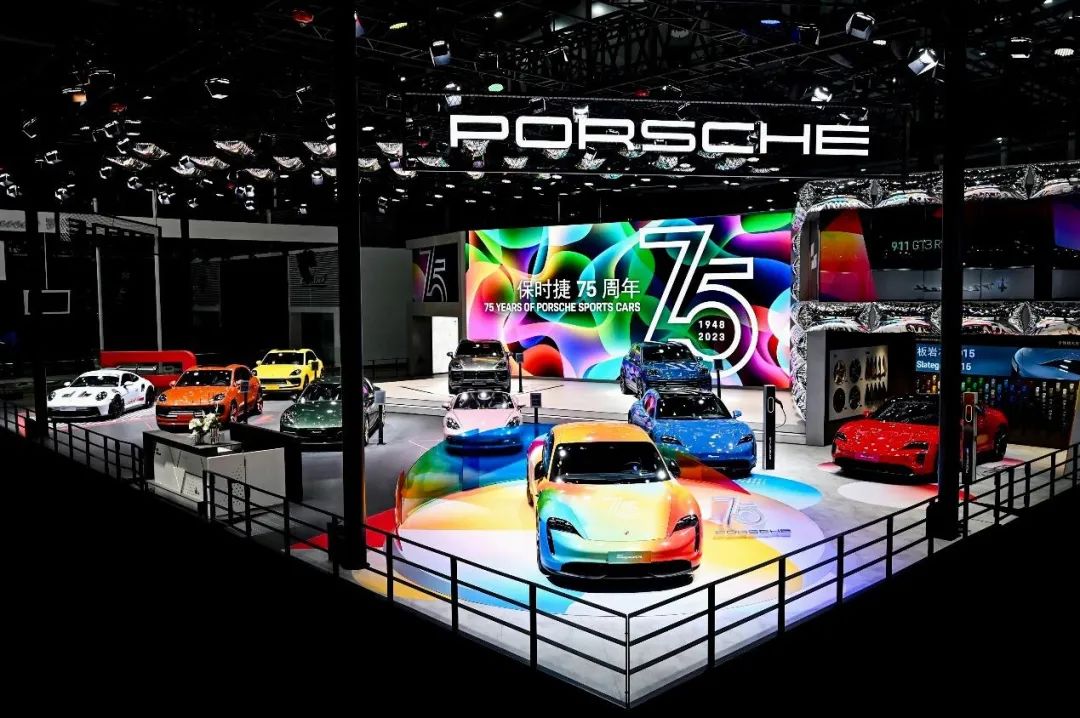
Image source: Porsche
Even the bare price of the lowest-priced Porsche Macan model (entry price of 578,000 yuan) has dropped to 440,000 yuan. And the all-new pure electric Macan, which was officially launched at the Beijing Auto Show less than a month ago, has also seen discounts of over 80,000 yuan in the terminal market.
It is reported that in addition to the Macan and Taycan, Porsche's other older models also have significant discounts. Among them, the best-selling Cayenne and Panamera have discounts of around 15%, while the 911 and 718 sports car series also have discounts of around 10%.
While the market terminal prices of multiple models have seen significant discounts, Porsche's high resale value defense line is also being broken. According to a relevant report released by the China Automobile Dealers Association, Porsche's 3-year resale value fell to 76.7% in April, in sharp contrast to its previously stable resale value of over 80%. As a "luxury" in the automotive consumer market, the decline in Porsche's resale value will inevitably further increase consumers' wait-and-see sentiment.
Inventory Pressure Crisis
Significant discounts mean a sharp drop in dealer profits, and even losses.
On one hand, there is a sharp decline in sales, and on the other hand, there is a significant reduction in prices, coupled with the manufacturer's inventory pressure measures, making Porsche dealers suffer.
According to dealers, Porsche China chose to put pressure on dealers to complete sales tasks, requiring them to "pressure inventory" and purchase a large number of vehicles, including some new energy models that are not best-sellers. This move completely shattered the dealers' psychological defense line.
Interface News cited sources close to the matter, stating that the three dealers initiating the joint protest, Xinfengtai, Baideli, and Meidong Group, are not core dealers in Porsche China. Therefore, their suggestion at the Porsche China dealer conference earlier this year to request subsidies from Porsche for new car gross margins did not receive timely feedback.
Public data shows that in 2023, the gross margins of Xinfengtai, Baideli, and Meidong Group decreased by 41.3%, 34.1%, and 17.5%, respectively, year-on-year. As a result, the net profits of all three dealer groups have seen significant declines.
In just a few months, the internal management and market strategy conflicts within Porsche China's brand have continuously intensified, ultimately leading three dealers, unable to ease operational pressure, to jointly launch a protest with most dealers.
It is reported that Porsche Germany headquarters has dispatched an investigation team to China to understand the specific situation and is expected to determine the final sales targets and solutions in August this year.
In its statement, Porsche China mentioned that Porsche China and all authorized dealers have always maintained a long-term and mutually trusting dialogue mechanism. Through thorough discussions, they seek effective ways to actively respond to market changes and discover new opportunities in challenges. These discussions involve many aspects, including but not limited to business policies, local customer insights, customer service, and electrification transformation.
However, Porsche's cooling in the Chinese market is considered to be related to its electrification transformation plan to a certain extent. In the opinion of industry insiders, the rapid electrification process in the Chinese automotive market has outpaced Porsche's adjustments. Both Porsche's proud appearance and handling are being constantly approached by Chinese brands.
In terms of luxury, although Porsche has stated that the company hopes to enter the high-end market and compete with brands like Ferrari and Lamborghini. However, for Chinese consumers, Porsche has always been between luxury and super-luxury brands and has not fully entered the super-luxury brand camp.
In addition, the main consumer group for contemporary automobiles has undergone fundamental changes in their demand for automobiles. "Chinese consumers' pursuit of high-end luxury has never changed, it's just that the definition of high-end luxury is no longer in the hands of traditional foreign brands," said a netizen. The high-end positioning of new energy vehicles has subtly influenced Chinese people's perception of luxury cars, and Porsche has not yet truly realized this change.
Moreover, Porsche's profit-oriented business philosophy has caused multiple "PR incidents" in China in recent years. From the "steering column incident" to the "buying a Porsche for 124,000 yuan" incident, Porsche has been criticized for its "arrogant attitude," which contrasts sharply with consumers' expectations of high-end brand service.
As the "most profitable brand" is also caught up in the price war, does Porsche still have a chance to turn the tables?

